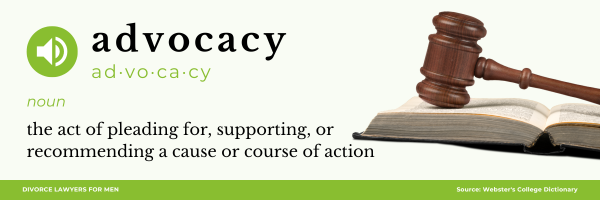Divorce Lawyers for Men’s work requires that we be attuned to the unique needs of men, both within the legal context of our work and in our interaction with clients.
Here are 5 tips to help you be a better advocate for your male clients:
1. Understand what advocacy means.
My Webster’s College Dictionary defines advocacy as “the act of pleading for, supporting, or recommending a cause or course of action.” My Black’s Law Dictionary defines it as, “The work or profession of an advocate. 2. The act of pleading for or actively supporting a cause or proposal.”
Of course, both our legal skills and ability to communicate openly are paramount to our success when advocating for clients.
Start the process of client communication with a thorough intake and build on it as your case expands. Keep your files and notes organized so that you can quickly refer to client-provided details. Be sure to use those details in drafting your legal arguments, settlement demands, and trial materials. Continue your commitment to open client communication throughout your representation. Always keep your client apprised of the status of their case, and routinely reach out to the client for updates on their status.
2. Know the law.

It seems obvious, but it somehow gets by-passed fairly frequently. Really know the law and how it applies to your client’s situation. This is where ‘close enough’ does not count. You must be proficient in the areas of law you practice. That includes knowing the local court rules and procedures so you do not get taken down by small procedural details that can easily be missed. Not only will your legal materials and arguments be more authoritative and convincing to the Court, but your client will quickly see that you appear to know what you are doing.
Though most of our current statutes and forms reflect a more gender-neutral approach to family law and other areas of law, it is still frequently an uphill battle to actually implement equity when dealing with some attorneys and judicial officers. The mentality that supports the “tender years doctrine” approach can run deep despite societal changes. Do not allow yourself to fall prey to that antiquated way of thinking, and do not allow your clients and their children to be subjected to it.
On the other hand, some would argue that men are less inclined to be compliant in following court orders than women might be. If your male clients are not being compliant with court orders or expectations, make sure that they understand the potential consequences of their actions. Do your best to help your clients posture themselves in the most advantageous manner for their cases. Hold them accountable for their actions.
3. Establish a relationship.
You can do that by showing care, compassion, and confidence. It is seldom a good idea to cross the attorney/client boundary and become friends with your clients. However, it is certainly important to develop a relationship of mutual trust.
Just taking the time to ask, “How are you?” and then genuinely listening to the answer will help you assess the mindset of your client. Showing that you care will help your client trust that you have their best interest in mind.
Showing compassion for the fact that they are going through a difficult time will help build your relationship with your client. It can also motivate you to work a little harder to help them achieve their goals. Having your client know and trust that you can be a confidante encourages a free flow of information that that will be beneficial when making decisions on how to proceed on their case.
Demonstrating confidence in your ability and willingness to understand a client’s concerns and doing your best to help them achieve their goals, or candidly explaining why those goals are not likely achievable, will help a client develop trust in you and your skills as an attorney.
4. Be aware of signs that someone is in crisis.
Part of being an advocate for others means being aware of signs that someone is in crisis. This is particularly true when someone is experiencing suicidal thoughts. According to a 2003 study published in the Journal of Epidemiology & Community Health¹, divorced and separated men are nine times more likely to kill themselves than divorced women, and they are 2.4 times more likely to kill themselves than their married counterparts. Individuals may behave differently in these situations, but there are some common warning signs of suicide that you should pay particular attention to:
- Threats to hurt or kill themselves or others.
- Looking for ways to kill themselves by seeking firearms, pills, etc.
- Feelings of hopeless.
- Feelings of rage or uncontrolled anger or seeking revenge.
- Acting recklessly or engaging in risky behavior.
- Increased alcohol or drug use.
- Experiencing dramatic mood swings.
- Seeing no reason for living or having no sense of purpose in life.
- Withdrawing from family, friends, and community.
You are not a counselor or psychologist, but it is still important to pay attention to these warning signs and take action to advocate if you feel that your client is at risk. Encouraging them or helping them to find professional help is important.
5. Pay attention to self-care.
It can be difficult to manage your own wellness while constantly trying to manage the problems of other people. When you are acting as an advocate for others it is important to manage expectations and draw boundaries that protect your own needs. Take time to care for yourself and to manage your own expectations of yourself. Part of advocating is to help individuals find the support they need. You do not have to do it all yourself.
Source(s):
1: Kposowa AJ. Divorce and suicide risk. Journal of Epidemiology & Community Health 2003;57:993.
Jeanne Sockle
Jeanne, co-founder and managing partner of Divorce Lawyers for Men, is a successful civil litigator who has focused her legal practice on complex litigation, primarily catastrophic injury and wrongful death lawsuits. She has served as a member and Chair of the Washington State Bar Association Law Clerk Board, as a Thurston County Family Court Child Advocate, and as a founding member of the Thurston County Volunteer Legal Clinic.






